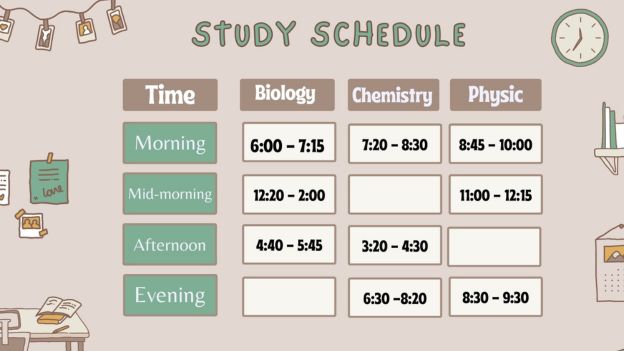September 06, 2024
Time Management Techniques for NEET Aspirants: A Step-by-Step Guide
Preparation for the National Eligibility cum Entrance Test is not just about working hard but how smartly one manages his or her time. This trio of school studies, coaching classes, and self-study is not an easy juggling act for NEET aspirants. Some fundamentals of effective time management might go a long way in this highly competitive examination. Here's a short guide to help you manage time better during your preparation for NEET.
1. Understand the NEET Syllabus:
First, understand the complete NEET syllabus. Knowing all the topics in Physics, Chemistry, and Biology will help you prioritize your studies. Make a list of all the topics and highlight those that you find difficult. This list will guide you on where to focus and how much time to allocate to each subject. Click here to get the detailed NEET syllabus.
2. Set Clear and Realistic Goals:
Clear and realistic goals are required for effective time management. Break down the main goal of cracking NEET into achievable small, daily, and weekly targets. For example, one should be able to complete one chapter from each subject every week. In this plan, give more time to challenging topics such as organic chemistry or human physiology.
3. Plan a Study Schedule:

Now, draw a study plan for all subjects, including revision and practice time. Your study schedule should include how much time each subject should receive every day. Allow some time for short breaks, or else you will get exhausted. This routine will enable you to manage your time when it comes to examinations. Check out Prepmed’s guide on how to create a study timetable.
4. Use time management tools:
Use planners, calendars, or applications like Google Calendar, Trello, or Todoist that will enable you to organize your study schedule and remind you about any deadlines. Having a clear mental image of your plan disciplines you and gives focus. Learn more about effective time management on Prepmed's website.
5. Employ the Pomodoro Technique:
The Pomodoro Technique allows one to study for 25 minutes, take a rest for 5 minutes, and repeat for four sessions before taking an extended break of 15 to 30 minutes. This allows a person to maintain his focus without wavering and not get tired easily and enables the study session to be productive. Click here to learn the Pomodoro Technique.
6. Engage in Active Learning:
Instead of just re-reading, use active learning methods such as summarizing, self-quizzing, or teaching concepts to others. In such a way, your learning will be consolidated and your memory will be enhanced. For better results, make time to do these activities by planning your study schedule. PrepMed offers interactive learning methods and access to previous years’ NEET question papers.
7. Revision Regularly and Test Practice:
Regular revision will help you retain whatever you have learned. Fix weekly revision time. Do practice with previous NEET question papers and try taking mock tests from time to time. This will help you get used to the pattern of the examination, which will enhance your time management skills in the examination. To know how to revise click here.
8. Avoid Multitasking:
Doing many things at one time reduces overall productivity and focuses on a particular task. It should be noted that studying one subject or topic at a time yields better comprehension and retention. Steer clear of distractions during study hours, such as social media. This makes you focus on just one task, and hence your study time becomes more efficient.
9. Healthy Lifestyle:
A healthy body supports a sharp mind. Ensure a sufficient amount of sleep (7-8 hours), eat nutritious meals, and add to your daily routine some form of physical exercise. A healthy lifestyle improves concentration, reduces levels of stress, and increases focus during study sessions. Click here
10. Be Flexible and Adaptable:
Although this is your study schedule, be free to improvise. If you happen to miss a session of study, or you feel that you need more time on a particular topic that is challenging, then adjust the time in your schedule. Being flexible will enable you to maintain a good balance with your studies and not feel stressed out by this.
Conclusion:
Effective time management is the most important thing that plays a vital role in the NEET aspirant's point of view to be successful in the examination. You can do better preparation by knowing the syllabus, setting goals, making a structured study plan, and using smart study techniques. You can gear up your preparation by availing tools and resources on PrepMed, including Study Aids, and Practice Tests, that will help in enhancing your possibilities of cracking NEET. Please visit PrepMed for more resources and tips about NEET goal achievement.
Follow Us - on Facebook /Instagram/ YouTube






